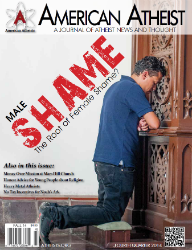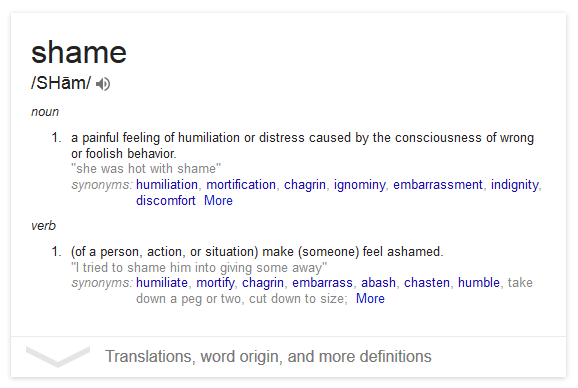In the newest issue of American Atheist magazine, Dr. Darrel Ray (my friend and colleague on the Secular Therapy Project) has written the cover story, entitled “Male Shame, the Root of Female Shame.” I would really encourage every to read the article (via an online subscription or through buying a print copy) as I found it very interesting and insightful. It’s not available for free online (AA puts up copies of it’s magazines for free after one year) but is really worth seeking out.
EDIT: The full article has been published by Dr. Ray on Patheos!
Dr. Ray has written and spoken extensively before about the role that religion and religious beliefs play in sexuality, even for those of us who are secular. His book Sex & God: How Religion Distorts Sexuality was a groundbreaking work on this topic, and he now runs a very entertaining and informative podcast called Secular Sexuality. Over the past year, he’s been working on an extension of that work, which is the topic of the AA cover story. The basic thesis of his article is that female shaming (from childhood on up) is a result of a very infrequently discussed topic – male shaming.
Now, before anyone goes and accuses me of being a shitlord or something equally MRAesque for bringing up the topic of “male shaming,” hear me out.
Darrel lays out a very cogent argument that certain types of religious beliefs – those that promote a gender binary with particular “appropriate” behaviors, roles, and expectations – result in patriarchal societies in which
…a man is only a man in relation to his status with women. If other men see him as submissive or subservient to a woman, he is less of a man. If he cannot control the women within his family, he is less of a man. If a woman can beat him in a so-called masculine activity, like a sport or an intellectual enterprise, he is less of a man. (p. 19)
He then goes on to hypothesize on how female shaming/controlling techniques (such as domestic violence, control of daughters’ behavior, even cultish behavior) can stem from the guilt and shame that patriarchal religions such as certain sects of Islam, Judaism, and Christianity cause male members if they violate the “right way” to be a man. One particularly potent example he used in the article involved the threat of eternal damnation to Hell and it’s relation to abuse:
The afterlife is an excuse for all kinds of control and abuse of children and spouses. In the name of the afterlife, fundamentalist Christians beat their children so they will not go to hell. Muslims disown or even kill daughters for having premarital sex. Mormons condemn their gay sons and kick them out of their homes. Concern for an afterlife gives a parent permission to invade a child’s private space, tell him what he can and cannot do with his body, ostracize him for sexual behavior that the god disapproves of, and beat or otherwise punish him for rebellion against the god. (p. 22)
Interestingly, Darrel is not the only person writing about this topic, although he’s the only one I’ve seen making a connection between male shame and religious beliefs. For instance, Mark Greene of the Good Men Project has a very good article titled How America’s Culture of Shame is a Killer for Boys that makes very similar points on how shaming of males for not being “male enough” is devastating to individuals and communities as a whole.
And because we Americans are so prone to using shame to get our way with others, it has infused our public and private lives. It is so universal, that we simply can not grasp the vastness of it. It is the forest we can not see for the trees. It is the very air we breathe and the water we drink. Shame is everywhere, insinuating itself into the memories of our childhoods and the voices of our loved ones. And the only clue we have of how universal shame actually is, is the privileged position it holds as that little voice in our heads that whispers over and over, “You’re never going to be good enough.”
In a companion article, Mark even lists the ways male-ness is displayed behavioral, very much in line with Darrel’s views:
- Man as provider
- Man as decisive
- Man as having the final word
- Man as sexually aggressive
- Man as emotionally stoic
- Man as straight
- Man as sports focused
 Could we, as a culture, make a massive decrease in incidents of domestic abuse, child abuse, and other forms of control of females and children by addressing male shame more frequently? Darrel thinks so, as the final part of his article is a call for change, for people to begin challenging the culture of male shame that then results in female shaming. He gives several questions to help you begin to recognize and challenge the ideas that you personally have regarding maleness:
Could we, as a culture, make a massive decrease in incidents of domestic abuse, child abuse, and other forms of control of females and children by addressing male shame more frequently? Darrel thinks so, as the final part of his article is a call for change, for people to begin challenging the culture of male shame that then results in female shaming. He gives several questions to help you begin to recognize and challenge the ideas that you personally have regarding maleness:
What shame messages were you taught? What secret beliefs about women or homosexuals do you harbor? What ideas about masculinity and power over women are part of your inner world? Where do you feel shame in your sex life?

